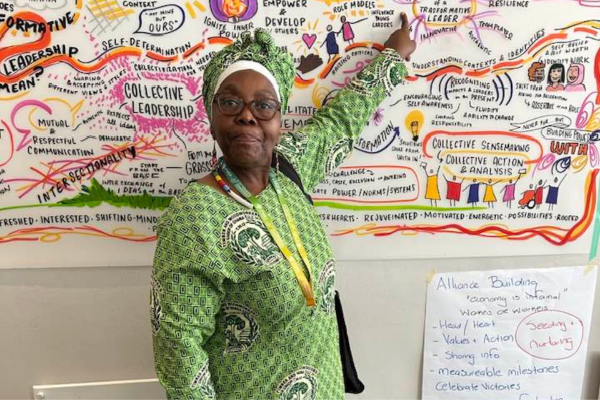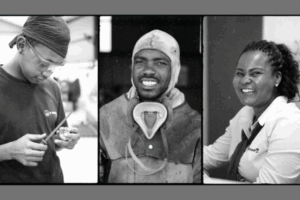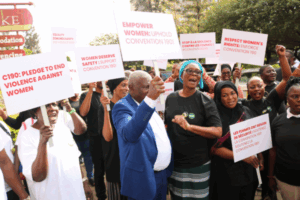We asked women leaders what the COVID-19 pandemic and lockdown have meant for their activism. Here’s what Crecentia Mofokeng, the Regional Representative for Africa at Building and Woodworkers’ International, had to say about transformative leadership and women’s leadership development.
What does transformative women's leadership mean to you generally, and in the context of the COVID-19 pandemic?
Transformative women’s leadership is the willingness and ability to holistically change how we view and approach issues to contribute to social change. Women excel at finding simple solutions for addressing social issues and can transform economic and political spaces. However, we must value professionalism and a collective environment. As an African woman, I am guided by the values of ‘ubuntu,’ like my ancestors, embracing and caring for everyone in my community. A transformative leader influences and encourages others to achieve set goals, respects different viewpoints, and creates an enabling environment for both women and men in the organization to develop.
In the trade union movement, workers own the organisations in which they are members. A transformative leader promotes both collectivism and individualism while respecting the values of worker control. A principled leader is a good listener who sees competing views as opportunities to explore new ideas that can spur organisational growth. Flexibility and a willingness to learn and adopt innovative ways of organising and campaigning are essential. Women inherently possess leadership abilities and ideas, evident in how we manage our homes, environment, and society. Yet, women leaders often work harder than their male counterparts to navigate boardroom spaces successfully. I urge women leaders to continue serving selflessly and focus on achieving their set goals.
Leaders are expected to lead by example, especially in observing guidelines for confronting the coronavirus pandemic. We can promote cooperation, communication, and collaboration to ensure teams follow these guidelines. The role of COVID-19 response officers in organisations is crucial for workplace safety. Our leadership style should be democratic now more than ever to encourage more participation in achieving COVID-19 control measures.
How is the pandemic affecting care work, and what does this mean for gender roles, stereotypes, and leadership going forward?
The pandemic has negatively impacted care work and the economy as a whole. Some of the human rights we fought for and enjoy, such as the freedom to decide our activities, destinations, and expressions, have been eroded. Frontline workers fear bringing the virus home after interacting with the outside environment, heightening fear and uncertainty. The care sector is predominantly powered by women, who are natural caregivers by nature. However, women’s propensity for care work is often used against us, leading some to devalue themselves. There is nothing stopping women from achieving their ambitions except for limiting cultural upbringings. Therefore, we should constantly advocate for women’s empowerment and leadership.
The pandemic has exposed gaps in our health systems, particularly the inadequate resources for care work. The lack of sufficient Personal Protective Equipment (PPE) exemplifies the existing knowledge and resource gap in African care work. More money is often allocated to military expenses. In contrast, women-led countries like Norway and Sweden prioritise quality healthcare, removing the inequality gap and making services affordable and accessible to all.
The pandemic necessitates hygienic conditions, yet this isn’t possible for everyone due to societal inequality. Governments need to commit to ramping up local manufacturing of goods for the benefit of the people. Healthcare workers should not lack PPE because of disarray in global supply chains. The fear of job losses due to the pandemic has affected the mental well-being of many workers. In our online meetings, women have discussed increasing violence and tensions at home due to the psychological effects of job losses and lockdown measures. The care burden for women has also increased. Leaders need to advocate for and lead multi-stakeholder campaigns to push governments to safeguard existing jobs and create enabling environments for supporting the emerging opportunities from this crisis.
Is COVID-19 prompting us to consider alternative leadership models?
The pandemic has urged us to explore alternative leadership models to tackle life-threatening challenges without resorting to militaristic, patriarchal, and non-democratic styles. We’ve witnessed women taking charge in their homes to ensure family safety, and in healthcare, women workers have demonstrated leadership in providing care. This presents an opportunity for women to expand their leadership roles.
The adoption of online communication tools has shifted education and meetings to virtual platforms. Unions are utilising online tools to communicate and serve their members, and women can do the same. It’s crucial to continue leveraging online communication methods as they bridge the gap between the right to communication and access to the right audiences.
During the pandemic, I’ve realised that women excel as leaders: they can negotiate, provide support, and care for affected workers. Women’s leadership deserves recognition, and they need opportunities to exercise their leadership abilities and skills.








